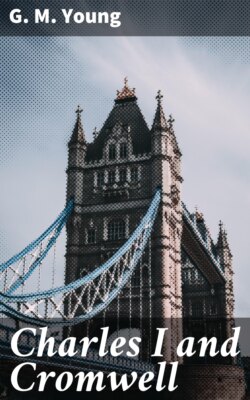Читать книгу Charles I and Cromwell - G. M. Young - Страница 6
II
ОглавлениеAs soon as the news of Astley's defeat reached him, the King wrote to Parliament proposing to return to London. Simultaneously, he wrote to the Scottish Commissioners, offering, if Parliament declined to receive him, to join the Scottish army at Newark. Parliament did decline, and the negotiations with the Scots went busily forward through the hands of a young French diplomat. Really, there was no ground on which the two could meet: vague phrases about his Majesty's just rights, and his Majesty's desire to be instructed in the Presbyterian government, meant nothing: and if Charles thought that he, or his agents, had committed the Scottish leaders to anything, he was mistaken. The Scots, in fact, were beginning to open their mouths rather wide. The King was slipping into their hands: Parliament was bound by the Solemn League and Covenant. They published their plans for the settlement of the Kingdom. Parliament replied with some asperity that any settling would be done by King, Lords, and Commons: in accordance, of course, with the Covenant (and God's Holy Word), but any doubt arising as to the interpretation of the Covenant (and the same Holy Word) would be determined, in the usual way, by Parliament and the Courts of Law. That their meaning might be perfectly clear, the Commons ordered the Scottish proposals to be publicly burnt.
It was hardly possible to send up a plainer signal to the King that definite proposals on his side would be welcome. The attitude of the Army was even more encouraging. Apart from isolated country houses, only two places still held out for the King, but the generous treatment of Exeter, when it surrendered, was an indication of what he might expect when Oxford opened her gates: there would be no trouble about the Covenant from Fairfax and Cromwell. Everything, in fact, was being done to make it easy for him to capitulate. He might still have joined the Queen in France: it was one of the many projects that flashed through his busy, impatient mind, and perhaps his wisest course would have been to retire from the scene until the Scots and the English, the Army and the City, the Presbyterians and the Independents, had argued one another to a standstill, and then return bringing peace in his hands. He preferred to go to Newark, and in the dark of an April night he rode over Magdalen Bridge on the long journey that ended at Whitehall.
He had persuaded himself that the Scots were not really so keenly set on Presbytery as they made out. It was the kind of mistake he was always making—the old Stuart mistake: his grandmother never quite believed that Englishmen might object to having their Queen murdered for her benefit. When he found that his countrymen were every whit as obstinate as he was, he propounded a compromise—legal establishment of Presbytery, toleration for Anglicans, and a joint heresy-hunt against everyone else. But the Scots, who had the gravest misgivings about English Presbytery in its purest form, were not at all disposed to countenance an Anglo-Presbyterian church, which would have lasted until the next Parliament abolished it. In June they delivered their ultimatum. It was what everyone except their unfortunate king might have expected: Covenant or nothing.
Now was the moment for Parliament to strike in with an offer which the King could at least consider. But though Parliament wanted peace they did not know how to make peace, and the nineteen propositions which arrived from Westminster at the end of July were no more conciliatory than the Scottish ultimatum. First came the Covenant, to be taken by the King and all his subjects. Then the 'utter abolishing and taking away' of the Anglican hierarchy (including the choirboys). Then the transference of fleet and militia, for the space of twenty years, from the Crown to Parliament. Finally, a long and complicated series of Branches and Qualifications involved the whole of the Royalist aristocracy and gentry in penalties varying from one third to two thirds of their estates. Parliament, in fact, believed that, the Scots having declined to support him further, they had the King at their mercy. He had only to abandon his Crown, his Church, and his friends, and he might, for what it was worth, be King of England still.
The terms were so exorbitant that the King was bound to refuse: so ungenerous that he would assuredly earn the goodwill of all reasonable men by refusing. The King of England—a prisoner in a foreign camp, forbidden to have his own chaplains, reduced to reading the Prayer Book alone in his bedroom—was becoming that dangerously attractive figure, the Injured Man; and it was against that background, in those weary, wasted months at Newcastle that the lineaments of the Royal Martyr first took shape. He answered with dignity that he could not accept the Propositions until he understood their exact import, and to understand them he must receive explanations. He proposed, therefore, to come to London and there treat with Parliament in person. But a royal journey to London in the cause of peace would have ended in a triumphal progress. His offer was not even acknowledged, and for half a year he was left in the Scottish camp weaving fresh combinations—his favourite, to which he clung obstinately till the end, was the establishment of Presbytery for three years, and an agreed settlement to follow—while the vital combination was being arranged over his head. On January 30th 1647, the Scottish army handed him over to the Parliamentary Commissioners, took their money, and marched away. For one happy fortnight the King was on the road again, through cheering crowds and clashing bells, from Newcastle to Holdenby House in Northamptonshire.
